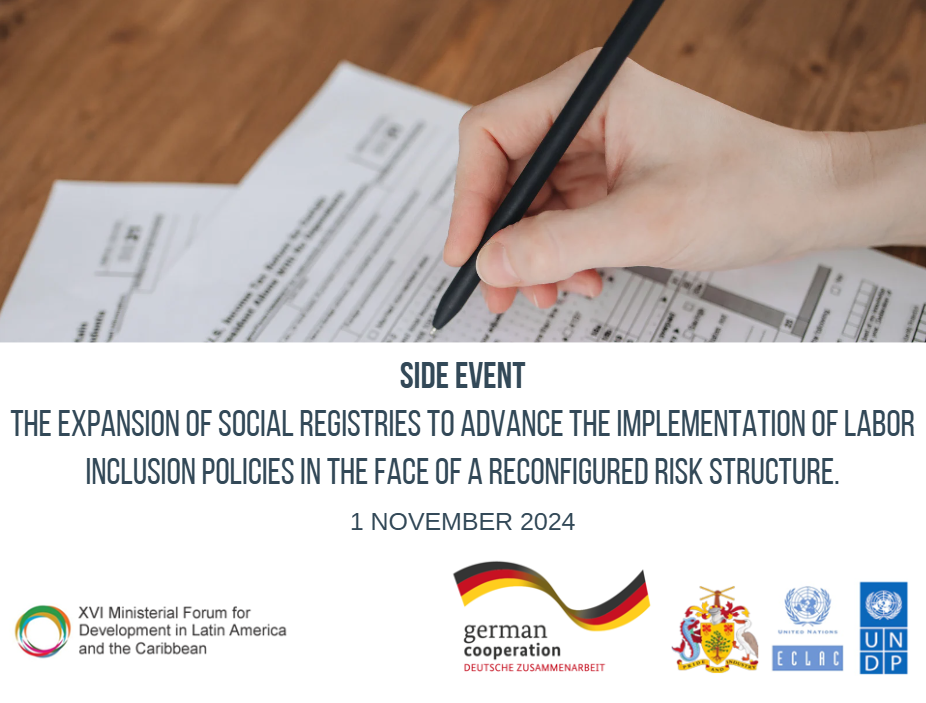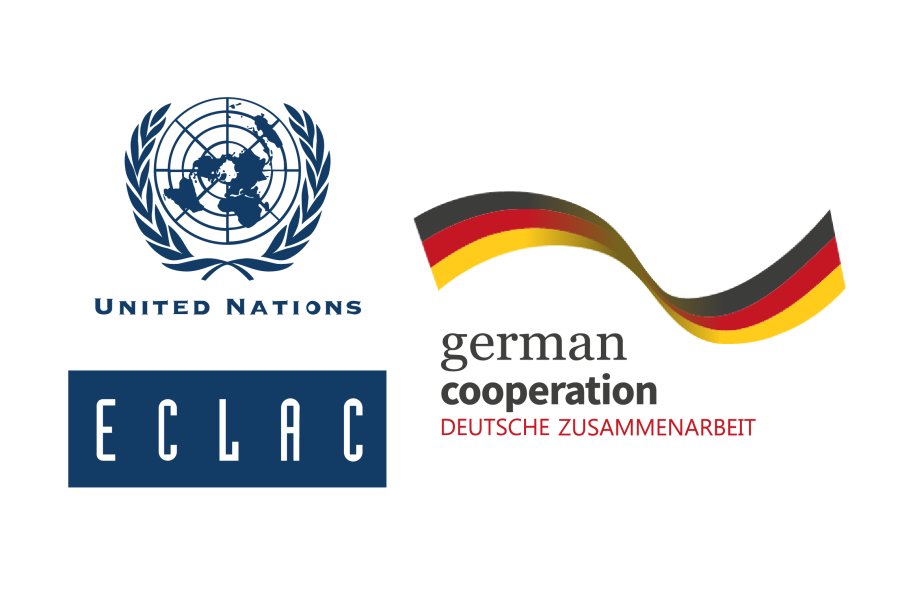Side event "The Expansion of Social Registries to Advance the Implementation of Labour Inclusion Policies in the Face of a Reconfiguring Risk Structure"
Work area(s)
Topic(s)
Teaser
The side event will address the challenges for social registers to have up-to-date and timely information required to confront shocks, disasters and the impacts of the climate crisis, assuring access to universal social protection, specially, for population groups with higher levels of vulnerability. Special emphasis will be placed on information and indicators for social protection policies that foster labour inclusion strategies, thus ensuring the livelihoods of this group and strengthen their resilience strategies for future shocks. The event is organised in the framework of the ECLAC-BMZ/giz Project “Productive, ecological and socially just economic transformation in Latin America and the Caribbean”.
Event information

Date
1 Nov 2024, 13:00 - 14:30Event type
Participation
Context
In recent years, Latin America and the Caribbean have faced a series of crises, including the COVID-19 pandemic and a growing number of disasters. This is part of a regional context marked by a development crisis, consisting of three traps: i) low levels of growth, ii ) high inequality and low social mobility, and iii ) institutional and governance weakness. These phenomena have impacted fundamental areas of people's daily lives, which has posed challenges for the countries' social protection systems in their dual capacity to respond to emergencies and disasters of various kinds, and to address the necessary structural transformations that the region requires to consolidate strategies aimed at developing human capacities. Faced with a risk structure that is being reconfigured due to the climate crisis, the challenges of digital transformation, demographic transition and changes in the world of work, among many other factors, the development and strengthening of social information systems and, in particular, social registries, is key to the design and decision-making in social protection policies, including the timely response to crises and disasters.
The ECLAC-BMZ/ GIZ project “Productive, ecological and socially just economic transformation” seeks to advance in strengthening countries’ capacities to design social protection systems to meet the challenges of a just transition with a gender and life-cycle approach, enabling the implementation of strategies that allow progress in the region towards labour inclusion and the sustainability of pension systems. Within this framework, social information systems play a key role in making decisions for the design of the best policies based on evidence.
As noted in the Social Panorama of Latin America and the Caribbean 2023, labor inclusion is both an objective and a component of social protection systems1. The design of their policies demands the availability of pertinent information on the most vulnerable populations in order to identify the barriers to access to the labor market that they face and to adapt the programmatic offer to their needs. In emergency contexts and in the face of the transformations that are being experienced in the world of work, and due to the technological revolution and the climate crisis, it will be essential to have mechanisms that allow the rapid activation of programs and actions that allow social protection systems to have preventive responses and for mitigation and adaptation to processes of change and emergencies. According to information from the Database of Non-Contributory Social Protection Programs in Latin America and the Caribbean, between 2010 and 2022, the number of laborXVI Ministerial Forum for Development in Latin America and the Caribbean inclusion programs aimed at the most vulnerable population in the region increased from 70 to 1172. It is worth noting that, during the pandemic, in addition to implementing measures aimed at protecting formal employment, at least 15 countries in the region also implemented non-contributory emergency measures for labour inclusion3. Likewise, ECLAC (2024) has estimated that, without active and robust policies to address its repercussions, climate change may lead to a relative loss of employment equivalent to 42.7 million jobs4.
In the face of these challenges, social registries are essential tools for social protection systems. In addition to allowing the incorporation of variables related to the risk faced by households and populations in the face of the possible implications of climate change and the greater exposure that workers may have to the transformations underway, they can substantially support the work of all public institutions involved in the design of policies for labor inclusion. These registries allow the coordination of work between the various institutions, facilitating synergies, allowing the identification of potential users of the various programs, reducing transaction costs and improving the efficiency of the systems for delivering social protection benefits. In short, expanding the coverage of social registries and their integration constitute a vital tool to maximize the impact of social protection policy and move towards universal, comprehensive, sustainable and resilient social protection systems.
Aim
This side event aims to promote the exchange of successful strategies and reflect on the challenges to advance in the expansion of the coverage of social registries, as well as the integration of bases for social information systems that allow progress in the inclusion of the population in the most vulnerable situation in labor inclusion policies. The event aims to provide a space for discussion on the elements to be considered in the implementation of universal social registries and social information systems that are relevant to the implementation of these policies, potential variables that could be incorporated into these instruments, as well as to discuss how the available technological tools can contribute to expanding the coverage of the most vulnerable population within them.
Methodology
The session will be structured around a round of interventions where the panelists will share their experience in relation to the following suggested questions:
1. What are the institutional opportunities and challenges for the process of expanding social registry coverage for vulnerable populations? (addressing institutional, coordination and financing elements) Do you consider self-reporting to be a useful tool for moving towards universal coverage of social registries?
2. Faced with the challenges of changes in the world of work, the climate crisis and disasters, what role do and could social registries play in the design of labour inclusion policies in the countries of the region? It is suggested that the panellists can delve deeper into these questions based on the experience of their countries. In closing, two commentators will elaborate on these elements based on regional experience.
1Economic Commission for Latin America and the Caribbean (ECLAC), Social Panorama of Latin America and the Caribbean, 2023 (LC/PUB.2023/18-P/Rev.1), Santiago, 2023.
2See [online] https://dds.cepal.org/bpsnc/
3According to information from the Economic Commission for Latin America and the Caribbean (ECLAC), COVID19 Observatory in Latin America and the Caribbean, database [online]: https://dds.cepal.org/observatorio/socialcovid19/ , “Social protection measures to face COVID-19”, Social Development and COVID-19 in Latin America and the Caribbean, database [online]: https://dds.cepal.org/observatorio/socialcovid19/listamedidas.php
4Economic Commission for Latin America and the Caribbean (ECLAC), Economic Survey of Latin America and the Caribbean, 2024 (LC/PUB.2024/10-P), Santiago, 2024.
Programme of work
Opening and welcome to the meeting
Alberto Arenas de Mesa, Director of the Social Development Division of ECLAC
Experiences and institutional challenges of social registries in a context of cascading crises and digital transformation of social protection systems
Kirk Humphrey, Minister of People's Empowerment and Elderly Affairs of Barbados
Javiera Toro, Minister of Social Development and Family of Chile
Yorleni León, Minister of Human Development and Social Inclusion of Costa Rica
Tadeo Rojas, Minister Ministry of Social Development of Paraguay
Closing questions and comments
Luis Tejerina, Social Protection and Health Division, IDB
Amalia Palma, Social Development Division, ECLAC


